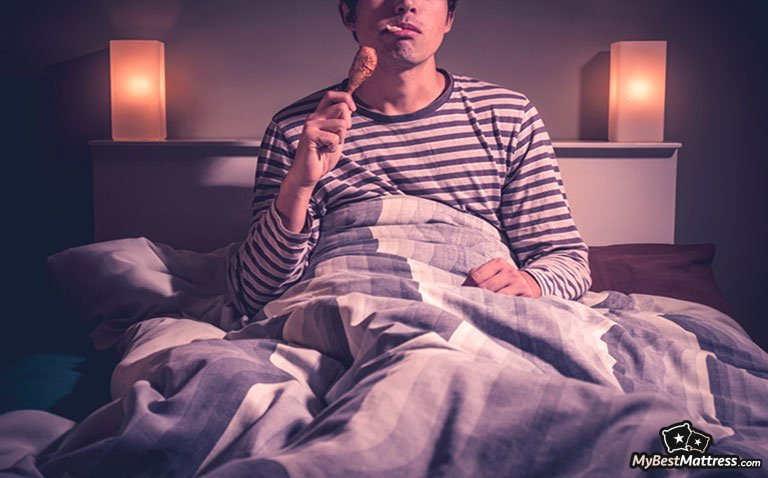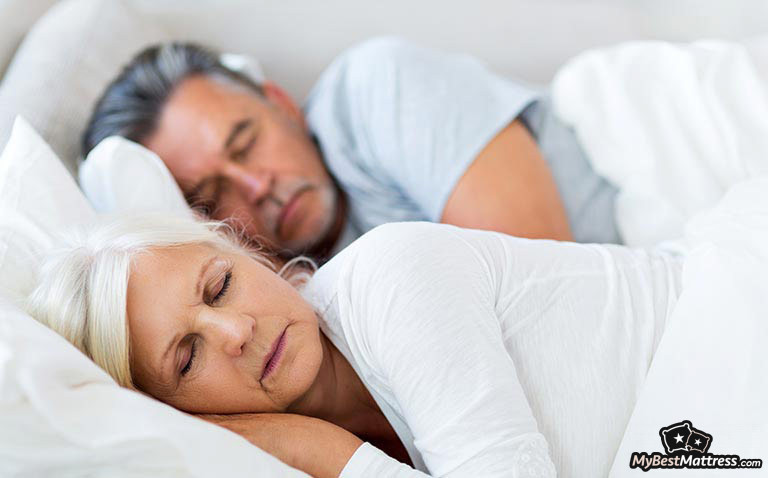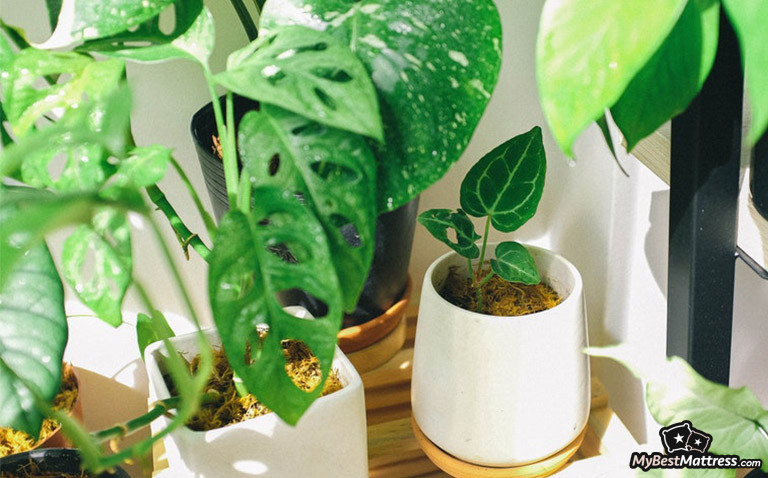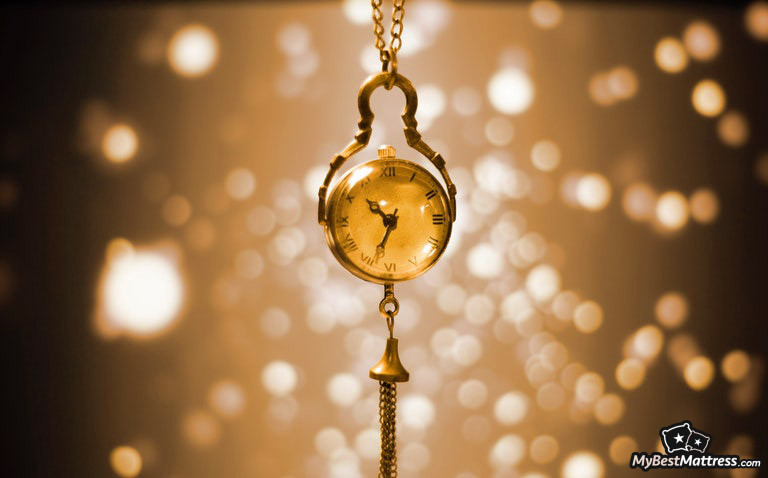
The busier you are, the harder it is to find time for eating and actually sitting down to have proper meals throughout the day. We’re used to being semi-hungry all through the day. And finally, we're only able to sit down and eat in the evening when we’re done with all the work we had to do in the day. And that’s how you end up eating before bed and eating a lot.
As you know, our bodies aren’t made for getting most of the calories required in one sitting. Being hungry after a day of running around, it’s easy to forget it. And when you finally get your dinner and the snack afterward, you might be thinking, “is it bad to eat at night?”.
This article will answer this and other questions, such as what to eat before bed and how eating late at night affects your sleep. If you’d like to learn more about these subjects, keep on reading.
How eating before bed affects our sleep quality?
Eating big meals close to bedtime can affect your body’s wind-down processes before bed. Foods that interfere with sleep include high-sugar and high-processed foods. Not only do these foods affect your metabolism but also blood sugar levels, both of which have an effect on sleep quality.
Table of Contents
Digestion
To answer “is it bad to eat before bed?” first of all, it’s important to understand how digestion works to learn how eating late at night affects it. It starts in the mouth: When you eat the food, you break it down and soften it by chewing as digestive enzymes start to release in the mouth.
Then, as food moves to the stomach and further down to the gastrointestinal tract and the intestines, more enzymes break down your meal. Some food molecules get absorbed into the body and what’s left gets packaged up as waste and passes through the colon.
When it comes to sleep and digestion, despite some myths, it doesn’t stop when you’re asleep. Your body is still capable of digesting food while you sleep. Although, like most of the other processes in your body, digestion slows down a little during the night time.
Pros of Eating Before Bed
When it comes to the “is it bad to eat at night?” question, the answer is - not necessarily! Actually, eating at night might do you good in some cases.
It’s Easier to Fall Asleep
Have you ever laid in bed not being able to fall asleep simply because your stomach was growling? You probably have. As you might’ve noticed it’s a lot harder to fall asleep when you’re hungry. You need to be relaxed in order to be able to fall asleep. It might leave you tossing and turning as you’re too busy worrying about food.

Let’s say you haven’t eaten in a while but you still manage to fall asleep. It might seem like the problem is solved, but it’s not. Your body can still react to hunger when you’re asleep. And it does, causing you to not be able to sleep deeply. This results in not feeling rested after sleep.
Having eaten you don’t have to deal with that anymore. Eating before bed, even if it’s just a little snack, can go along way when it comes to falling asleep and actually waking up rested.
Prevents Blood Sugar from Dropping at Night
Another positive aspect of eating before bed is maintaining your blood sugar levels. Blood sugar level is the concentration of glucose in the blood. Blood sugar is the main source of energy your body uses. ~20% of the blood sugar is used up by the brain while the rest is distributed to other cells and organs to function properly. It’s important to keep up the right blood sugar level to keep your body working properly.

When your body realizes that the blood sugar had dropped it sends a hunger signal to the brain. Not eating before bed does just that. It happens after a period of fasting, especially if it’s prolonged, having not eaten before bed. It seems fine, as you can always eat breakfast when you get up, but it might distort your metabolism and eating habits.
If your blood sugar drops considerably, your body might panic. Then you’ll feel the urge to binge on everything you see. As you know, it’s not healthy to eat such large portions and it leads to overeating. Experiencing that often will surely lead to weight gain. That’s why it’s said that you’d better eat smaller portions of food more often than eat a few large meals.
And so eating before bed is sure to keep your blood sugar levels up that's beneficial to your health. Just make sure to not overeat on food that’s hard to digest.
Boost Metabolism and Help Muscle Growth
Furthermore, eating before bed boosts your metabolism. Those who want to lose weight must have read countless articles on metabolism and how it works, and they must’ve learned that it’s complicated. But what is known, is that the better your metabolism is, the easier you lose weight.
In order to boost your metabolism, your body has to have something to metabolize. Small healthy snacks help that. Furthermore, muscle is built while you rest and protein is needed for that. Eating a snack that’s high in protein just before bed will help those processes in your body.
Your Body Needs Energy for Sleep
Another thing eating before bed provides us with is energy. We think of sleep as a rest period when we’re not doing anything, but there are many processes going on in our bodies while we sleep. Your subconsciousness still controls your breathing, heartbeat, digestion, muscle building and many more. Just like everything we do, that requires calories.

So, in order to help those processes, you need to eat enough calories. In case you haven’t eaten enough during the day, eating before bed to replenish the energy used in the daytime and save some for sleep would do no harm.
Cons of Eating Before Bed
If you want to know is it bad to eat before bed, I can tell you that yes, it might be in some cases. There are quite a few positive outcomes of eating before bed, but there are also some negative effects it could have on you.
Acid reflux
One of them is acid reflux. Acid reflux is not quite a pleasant feeling. It occurs after eating before bed when your digestive juices travel up to your esophagus and that results in the uncomfortable heartburn. It might also induce vomiting, bloating, nausea or coughing.
When you eat right before bed and then go lie down, that happening becomes way more probable, simply because of your body digesting while in a position that’s the least suitable for that.
You can avoid that by not lying down directly after eating. Spend your time sitting in your bed relaxing. Another way to avoid that is to prop yourself up with some pillows. This way gravity does the work and your stomach acid juices don’t go up to your esophagus and cause you the uncomfortable sensations.
Interrupted sleep
If you keep eating before bedtime you might develop the night eating disorder. It’s diagnosed when you eat at least a quarter of your daily calories after dinner. Getting used to snacking after dinner might make you wake up at night just to get a snack.
Also, eating this much at night results in you not being hungry in the morning and hungry at night again, making it a vicious cycle.

It also interrupts your sleep pattern. Waking up at night doesn’t do your sleep any good. Sleep being constantly interrupted decreases both the quality and quantity of it. As you must know, lack of sleep results in a lot of health issues and also affects your moods, making you feel fatigued and unwilling to do things you’d like to do.
Heavy meals might make you feel queasy
As mentioned before, eating before bed, if it’s light snacks, can do you good. But what if your light snack ends up being a full second dinner equivalent? That might not do your sleep and your digestion any good.
Feeling bloated and too full makes you feel uncomfortable. Heavy nighttime eating might also lead to indigestion. Indigestion comes with a set of uncomfortable symptoms like feeling too full, stomach pain and nausea. Those are all things you don’t want to experience.

Especially, you don’t want them when you’re trying to fall asleep. What’s really important when you’re trying to sleep, is getting comfortable. All these feelings may prolong or even prevent you from getting the necessary snooze. You don’t want to miss out on sleep simply because of eating a little too much.
Foods to eat
Now you learned that eating before bed might not necessarily be such a bad thing, and the side effects can easily be prevented if eating isn’t overdone. Naturally, the next question is what’s the best food to eat if you’re eating late at night. Here’s a list of foods that are the best options when it comes to eating before bed.
Fish
The main reason why fish is good for sleep is that it’s high in Vitamin B6. Vitamin B6 is responsible for the production of melatonin. Melatonin is a hormone, that’s responsible for regulating your sleep: making you sleepy and helping you wake up. The more Vitamin B6 you get, the easier melatonin will be produced and you’ll be able to fall asleep with no hassle.
Whole grains
Whole grains are rich in magnesium which is extremely important for falling and staying asleep. Try to incorporate some whole grain bread or crackers into your bedtime snacks to ease yourself into sleep more pleasantly. The more magnesium you get, the easier falling asleep will be.
Dairy
Your mom was right about the glass of warm milk before sleep. Dairy has a lot of calcium. Calcium is responsible for many things in our bodies and one of them is muscle relaxation. That’s exactly what you need before sleep. Furthermore, dairy is filling. Having dairy before sleep will lower the chances of getting up in the middle of the night feeling hungry.
Cherries
If you’re thinking about what to eat before bed, eat cherries! Oddly specific, I know. But cherries have been proven to help you fall asleep by inducing melatonin production. And they’re also tasty which is always a pleasant thing to fall asleep after. So get some cherries or cherry juice and get ready to doze off quickly.
Almonds
Another thing that answers the question of what to eat before bed is almonds. All nuts have plenty of healthy fats in them that are good for your health. Almonds specifically are known to be rich in magnesium and tryptophan. Both of them are great for a good night’s sleep since they help with muscle relaxation and nerve function.

Being relaxed before sleep is essential for falling asleep easier. And using additional help from food to achieve that will do you good.
Foods to avoid
There are some foods you'd better not eat if you want to sleep well.
Fatty food
Avoid fatty food, especially if it’s fried, before sleep. Fatty food is hard to digest and might leave you feeling bloated and uncomfortable just before sleep. To digest that a lot of stomach acid is needed and that raises the chances of getting acid reflux. Especially because you’re going to spend your time in a horizontal position, which makes getting acid reflux more probable.
Coffee
If you're wondering why coffe is bad for you before sleep, that could be answered in one word: caffeine. As you know caffeine, which coffee is high in, is a stimulant that helps you stay awake. That’s the complete opposite of what you want to achieve before going to bed. Caffeine stimulates your Central Nervous System and sends signals that you need to stay alert.

Try to eliminate coffee completely in the evening so your sleeping isn’t troubled. In fact, make sure you’re not drinking other caffeinated beverages like most teas (except for herbal ones) and energy drinks.
Conclusion
There is no straightforward answer to the “is it bad to eat before bed?” question. Yes, it might be, but it could also be beneficial. Eating before bed might help you fall asleep easier, prevent your blood sugar from dropping, which would result in being extremely hungry in the morning. It can also boost your metabolism, and give you the energy that sleep requires.
Although it might also cause acid reflux because of digestion in the horizontal position, or interrupt your sleep due to constant snacking instead of sleeping. It’s also easy to overeat and trouble your body with feeling bloated when trying to sleep.
If you decide that eating before bed is a necessity for you, opt for fish, whole grains, dairy, cherries or almonds. All these foods have beneficial components that improve your sleep quality. Make sure to avoid fatty foods that are hard to digest and coffee, that prevents you from falling asleep.
So, if asked is it bad to eat at night, you could say that no, it’s not. Just do it in moderation to avoid possible problems caused by wrong foods or unnecessarily big amounts of them. That way you'll improve your sleep quality. If you’re curious about other aspects of possible sleep issues, check out our other sleep guides.
Contributed By Caleb Backe, Certified Personal Trainer, Health & Wellness Expert
Caleb Backe's work with natural product development has given him insight and expertise in the health industry, as well as an attuned understanding of the wellness world. When Caleb is not developi...
Read Full Bio...Leave your honest feedback
Leave your genuine opinion & help thousands of people to choose the best mattress. All feedback, either positive or negative, are accepted as long as they’re honest. We do not publish biased feedback or spam. So if you want to share your experience, opinion or give advice - the scene is yours!














